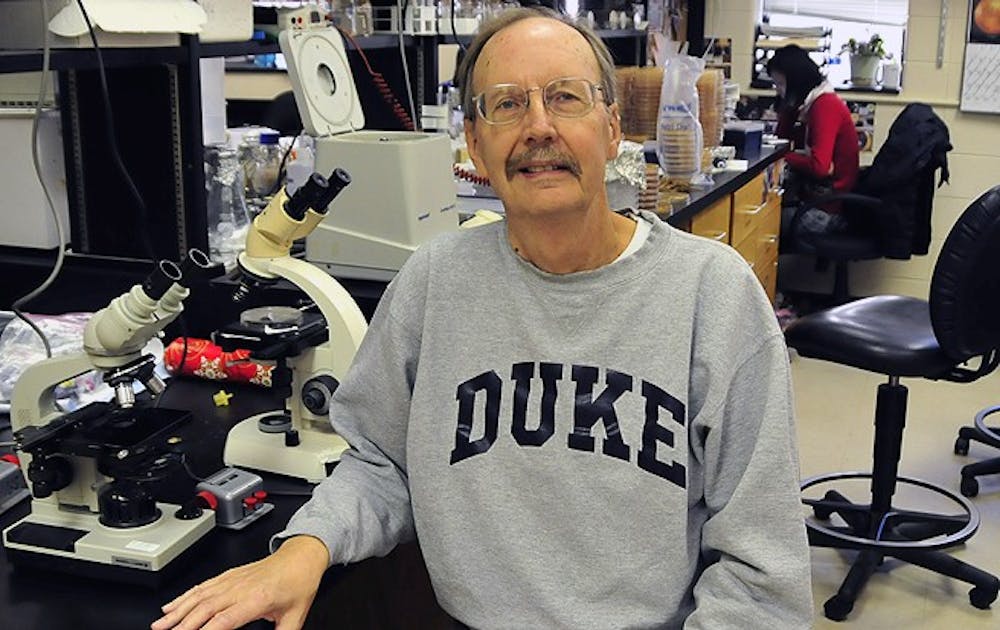Duke geneticist Thomas Petes explores the mechanisms of cancer cells by examining a less menacing subject—yeast.
The Genetics Society of America recently named Petes the 2013 recipient of the Thomas Hunt Morgan Medal for lifetime achievement in genetics. Petes, Minnie Geller professor of molecular genetics and microbiology at the School of Medicine, has dedicated his career to genetics studies in yeast. His research has shed light on possible cancer treatments by making the connection between properties of yeast cells and the development of cancer.
“It was a big surprise and it was also a great pleasure,” Petes said of the award. “It’s really gratifying to get this award because I’ve been a member of the Genetics Society for a long time. I know many of the people in the Society, and I have tremendous respect for them, so it’s nice—an award from people you respect.”
The lifetime achievement award is given for discoveries throughout a career, not just one finding, Petes noted. He began his research on baker’s yeast—the same yeast used in making bread or beer—as a graduate student, and has focused on it for more than 30 years since.
Petes’ most notable discovery is in finding out that certain mutated yeast genes have properties similar to those in human cells. Some of these genes are related to ones that are mutated in cancers, in particular colorectal cancer.
DNA polymerase is an enzyme that carries out DNA replication, but sometimes it makes mistakes in the process. Usually DNA’s mismatch repair process corrects these mistakes, but if there is something wrong with this process, there is an elevated frequency of mutations in the whole genome, Petes said.
DNA damage responses, which are necessary for the survival of all organisms from bacteria to man, are similar enough between yeast and humans that processes, like DNA replication, of one can inform about pathways of the other.
“Breakthrough studies in yeast, like those done by Dr. Petes, help direct what studies we do in higher organisms,” Dr. Michael Kastan, executive director of the Duke Cancer Institute and William W. Shingleton professor of pharmacology and cancer biology, wrote in an email Tuesday.
Given these similarities, yeast is an ideal organism to study, Petes said. The unicellular microorganism is also inexpensive, easy to do experiments with and can be frozen for long periods of time then defrosted for use later, making it more appealing for study than a larger organism.
“If you have Petri dishes and a medium and toothpicks you can actually find out a lot about yeast,” Petes said. “When you’re looking at bigger or more complicated eukaryotes, even with Drosophila, the experiments start to get complicated and expensive.”
When Petes’ lab initially began looking at mismatch repair mutations in yeast, they were looking at whether the enzymes affected the speed of simple repetitive sequences called microsatellites. As they were writing up the study, however, they found that cancer researchers had found similar microsatellite properties in cancer, hinting at a connection between the two.
“At the time [the cancer researchers] weren’t aware of the yeast work so they didn’t make the connection with DNA mismatch repair,” he said. “Our contribution was making that connection pretty clear.... The basic research done with bacteria fed over into yeast work that we were doing and that immediately connected up with the clinical work that other people are doing with cancer.”
Currently, the lab is working on a different type of cancer where the cells contain extra or rearranged chromosomes.
Petes noted that although people often single out an individual as if he or she has done everything, labs are collaborative in nature.
“I’ve had a lab for about 35 years and I’ve had a lot of talented students, [post doctorates] and technicians that have done the work,” he said. “I basically stopped working in the lab in terms of test tubes and Petri dishes 25 years ago, so the work has not been done by me, it’s been done by the people in my lab.”
Members of his lab noted that he has always emphasized the team aspect of scientific research.
Jordan St. Charles, a graduate student in Petes’ lab from 2009 to 2012, added that Petes spends a lot of one-on-one time with each member in the lab and is very dedicated to his work.
“Petes has compared being a scientist to being a monk—not so much a career as a calling,” Sabrina Cote, a postdoctorate in Petes’ lab, wrote in an email Wednesday.
Get The Chronicle straight to your inbox
Signup for our weekly newsletter. Cancel at any time.

